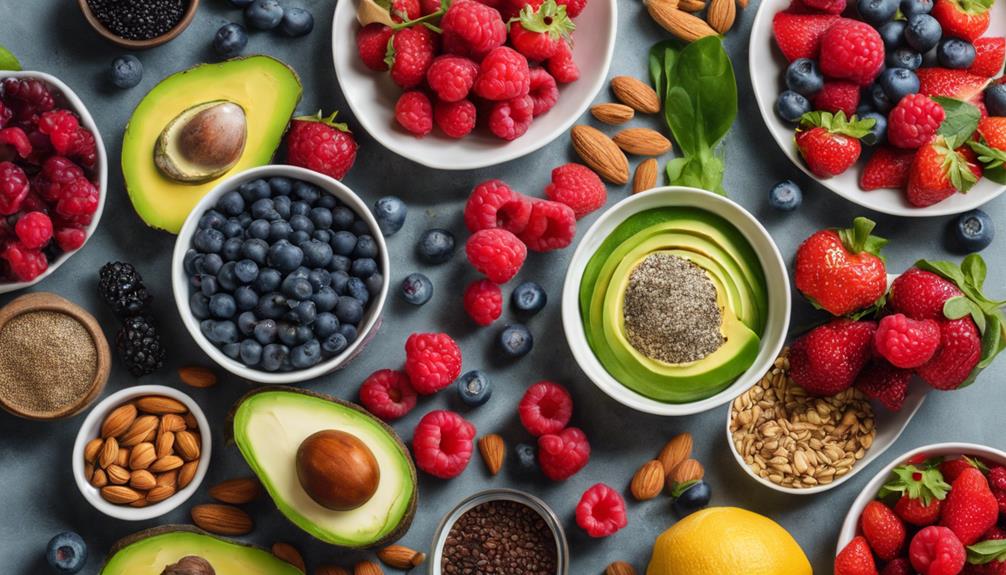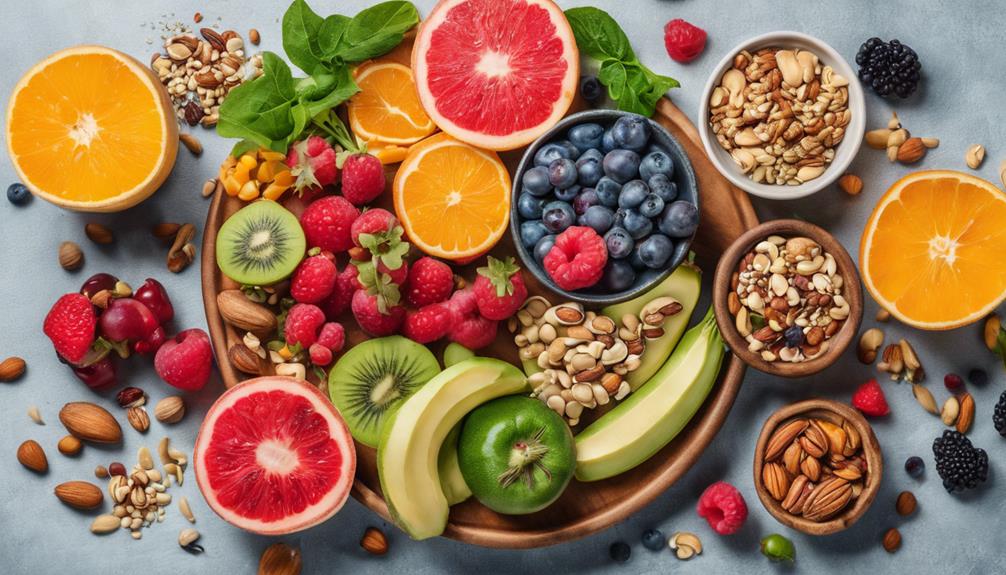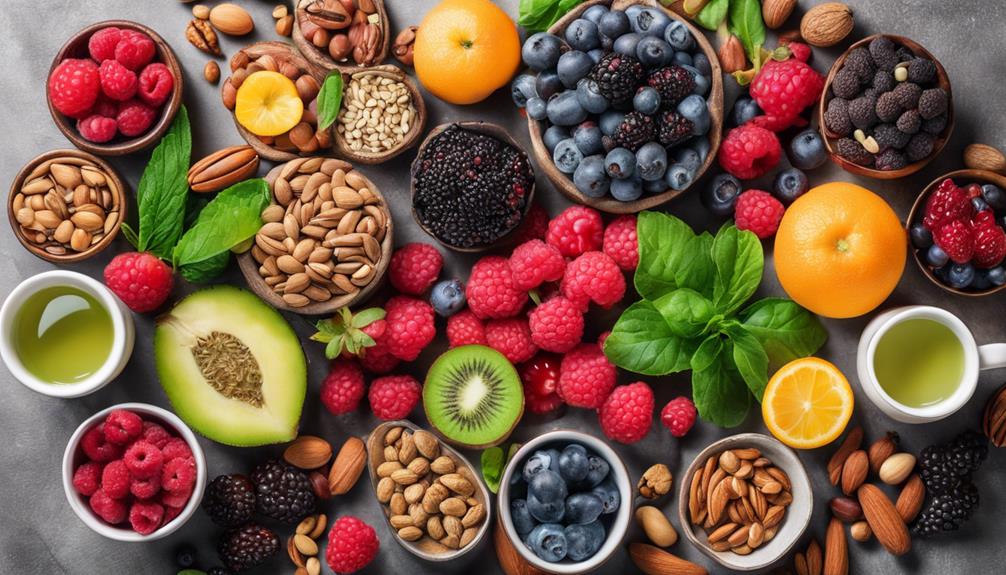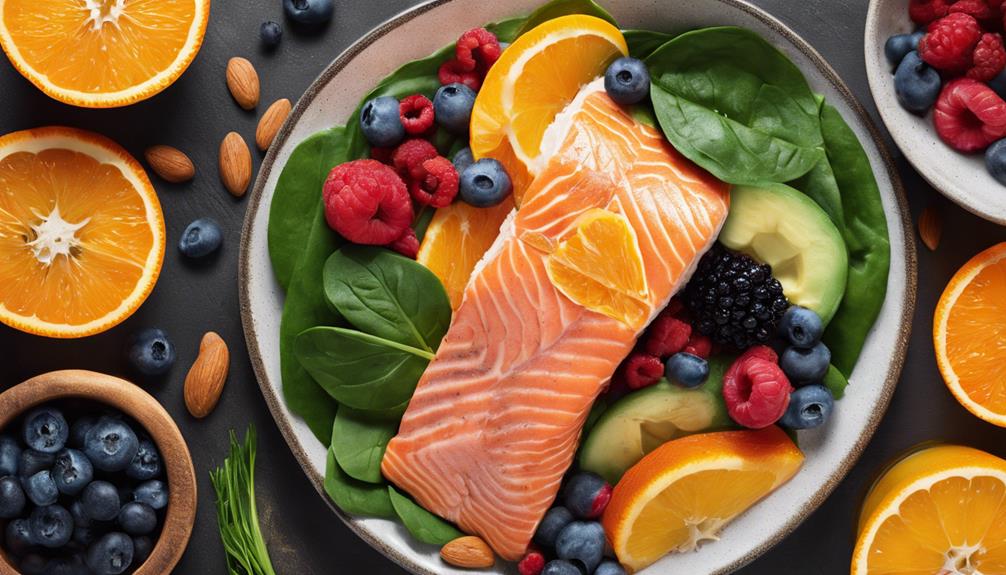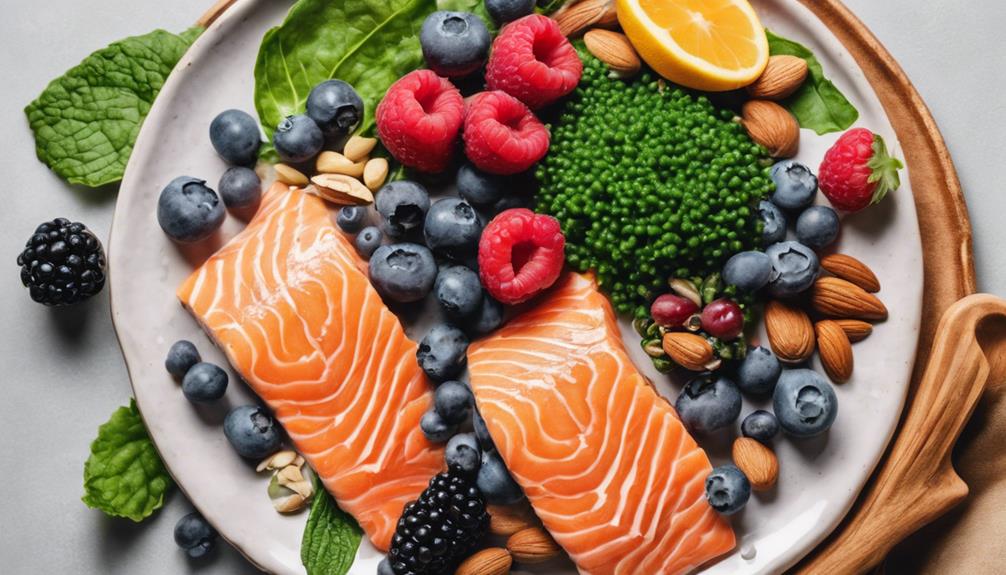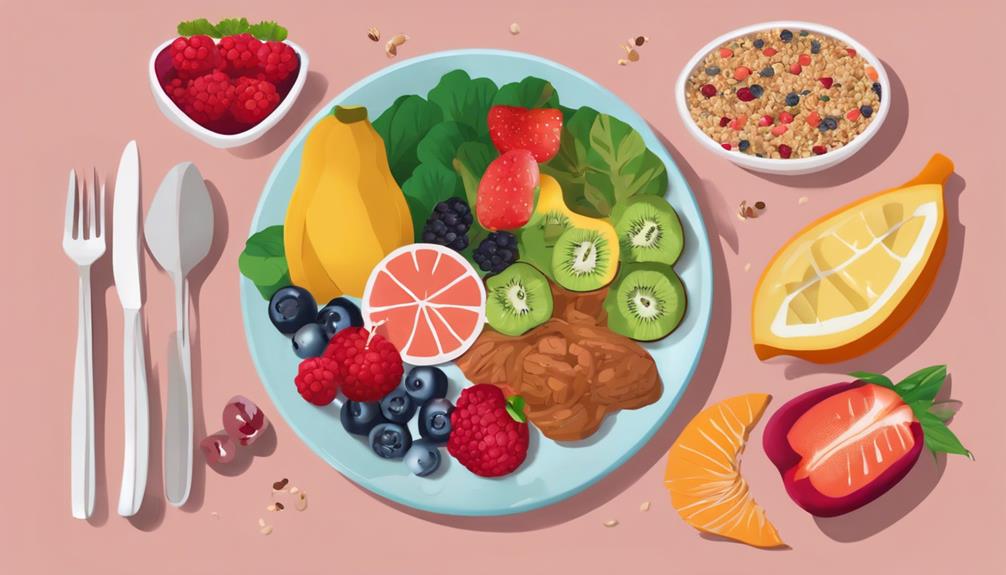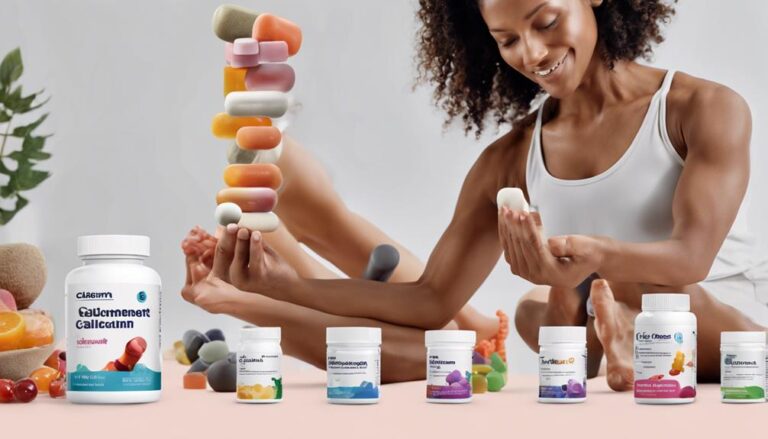Revamp Your Diet for Healthy Skin
Enhancing your diet to promote healthy skin is like nourishing the soil to grow a vibrant garden. Imagine the impact of feeding your skin from the inside out with a selection of beneficial nutrients. By making simple dietary adjustments, you can unlock the potential for a glowing complexion that radiates health and vitality. So, are you ready to explore the transformative power that your daily food choices can have on your skin's well-being and appearance?
Key Takeaways
- Include antioxidants for skin protection and repair.
- Consume omega-3 fatty acids for skin hydration and elasticity.
- Prioritize collagen-boosting foods for firm skin.
- Hydrate adequately for skin resilience and elasticity.
- Avoid sugary and dairy-rich foods for clear skin.
Importance of Diet for Skin Health
Ensuring your diet is rich in essential nutrients is crucial for maintaining healthy skin. Nutrient absorption plays a vital role in how your skin looks and feels.
For example, vitamins like A, C, and E are antioxidants that protect your skin from damage and promote collagen production, which enhances skin elasticity. Omega-3 fatty acids help maintain skin hydration by supporting the skin barrier function, preventing moisture loss and reducing inflammation. Zinc is another essential nutrient that supports skin health by aiding in wound healing and reducing acne breakouts.
To maximize nutrient absorption for healthy skin, focus on a diet rich in fruits, vegetables, whole grains, lean proteins, and healthy fats. These foods provide a variety of vitamins, minerals, and antioxidants that support overall skin health. Additionally, staying hydrated is crucial for skin hydration. Drinking an adequate amount of water helps flush out toxins, maintain skin elasticity, and promote a healthy glow.
Hydration and Skin Elasticity
For optimal skin health, maintaining proper hydration is essential as it directly influences skin elasticity. Your skin's elasticity is crucial for a youthful appearance and overall health. Adequate water intake plays a significant role in keeping your skin hydrated, plump, and resilient. When you're dehydrated, your skin can appear dry, tight, and more prone to wrinkles and sagging. To enhance skin elasticity, focus on your dietary habits and ensure you're consuming enough water throughout the day.
Incorporating foods with high water content, such as fruits and vegetables, can also contribute to your overall hydration levels. Additionally, limiting dehydrating beverages like alcohol and excessive caffeine can help maintain skin hydration. By making conscious choices to prioritize hydration through both water intake and dietary choices, you can support your skin's elasticity and promote a healthy, glowing complexion.
Antioxidants for Skin Protection
To protect your skin from environmental damage and promote its overall health, incorporating antioxidants into your diet is crucial. Antioxidants are powerful compounds that help combat free radicals, which can contribute to premature aging and skin damage.
Including antioxidant-rich foods like berries, leafy greens, nuts, and seeds in your meals can provide your skin with the protection it needs to maintain its healthy glow.
In addition to consuming antioxidants through your diet, consider incorporating topical antioxidants into your skincare routine. Products containing vitamins C and E, green tea extract, or resveratrol can further enhance your skin's defense against oxidative stress and UV damage.
Look for serums or creams that are specifically formulated with these beneficial ingredients to maximize the protective effects on your skin.
Omega-3 Fatty Acids Benefits
When aiming to enhance your skin's health and appearance, incorporating omega-3 fatty acids into your diet can be a game-changer. Omega-3 benefits extend beyond heart health; they play a crucial role in skin hydration, making them a must-have for a glowing complexion.
Omega-3 Fatty Acids Benefits
Here is a breakdown of the skin benefits of omega-3 fatty acids:
| Omega-3 Benefits for Skin | Description |
|---|---|
| Skin Hydration | Omega-3s help maintain the skin's natural oil barrier, reducing moisture loss and promoting hydration. |
| Anti-Inflammatory Properties | These fatty acids can calm skin inflammation, reducing redness and irritation. |
| Protection from UV Damage | Omega-3s may offer some protection against sun-induced skin damage and help in maintaining skin resilience. |
| Enhanced Skin Elasticity | By supporting skin cell regeneration, omega-3s can improve skin elasticity and reduce the appearance of fine lines. |
Incorporating omega-3 rich foods like fatty fish, flaxseeds, and walnuts can significantly contribute to your skin's health and overall well-being.
Collagen-Boosting Foods
Boosting collagen production is another key aspect of maintaining healthy and youthful skin. Collagen is a protein that provides structure to your skin, keeping it firm and elastic. To promote collagen production, incorporate collagen-boosting foods into your diet.
Foods rich in vitamin C, like citrus fruits, strawberries, and bell peppers, help your body produce collagen. Additionally, foods high in amino acids, such as lean meats, fish, eggs, and dairy products, support collagen synthesis. Including foods like soy, tofu, and beans can also aid in collagen production.
Skin hydration is crucial for collagen to function effectively. Drinking an adequate amount of water daily helps keep your skin hydrated and supports collagen structure.
Hydrating foods like cucumbers, watermelon, and leafy greens contribute to skin hydration, promoting a healthy complexion.
Vitamins for Skin Repair
Numerous vitamins play a crucial role in skin repair, aiding in the healing process and maintaining skin health. When it comes to nourishing your skin from the inside out, incorporating skin-loving vitamins into your diet is essential. Here are some key vitamins that can help support skin repair and overall health:
- Vitamin C: Known for its antioxidant properties, Vitamin C helps in collagen synthesis, which is vital for skin repair and maintaining skin elasticity.
- Vitamin E: This vitamin is a powerful antioxidant that protects skin cells from damage caused by free radicals, helping in skin repair and promoting a youthful appearance.
- Vitamin A: Essential for skin health, Vitamin A promotes cell turnover and repair, aiding in the healing of damaged skin and maintaining a smooth complexion.
To ensure you're getting these essential vitamins, consider incorporating nutrient-rich foods and skin-nourishing supplements into your daily routine for healthy, glowing skin.
Foods to Avoid for Clear Skin
To maintain clear and healthy skin, it's crucial to be mindful of the foods you consume. Two key culprits that can impact your skin health are sugar and dairy.
The sugar impact on your skin is significant. Foods high in refined sugars can lead to increased inflammation in the body, which may manifest as acne, redness, or other skin conditions. Sugary treats like candies, sodas, and pastries can spike your blood sugar levels, triggering a cascade of reactions that can negatively affect your skin's appearance.
Dairy products present a dilemma for those aiming for clear skin. Some individuals find that consuming dairy can exacerbate skin issues like acne. This may be due to the hormones present in dairy products, which could disrupt your skin's natural balance. If you suspect dairy is causing skin problems, consider reducing your intake and monitoring any changes in your skin's condition.
Being mindful of your sugar intake and dairy consumption can play a significant role in promoting clear and healthy skin.
Gut Health and Skin Connection
Enhancing your gut health can have a profound impact on the condition of your skin. The connection between your digestive system and skin health is strong, with the balance of good and bad bacteria playing a crucial role. Here's how improving your gut health can benefit your skin:
- Probiotic benefits: Consuming probiotics can help maintain a healthy balance of gut bacteria, which in turn can reduce inflammation in the body and potentially improve skin conditions like acne and eczema.
- Digestive health: A well-functioning digestive system is essential for overall health, including skin health. When your gut is healthy, it can better absorb nutrients that are vital for skin repair and maintenance.
- Microbiome support: The collection of microorganisms in your gut, known as the microbiome, influences various aspects of your health, including skin conditions. Nourishing your gut with a diverse range of foods can support a healthy microbiome, potentially leading to clearer and more radiant skin.
Anti-Inflammatory Diet for Acne
Improving your diet by incorporating anti-inflammatory foods can play a significant role in managing acne. Acne prevention involves more than just topical treatments; what you eat impacts your skin's health. An anti-inflammatory diet focuses on reducing inflammation in the body, which can help prevent acne flare-ups and promote clearer skin. Foods rich in antioxidants, omega-3 fatty acids, and vitamins A, C, and E can aid in inflammation reduction and support overall skin health.
Here's a simple guide to anti-inflammatory foods that can benefit your skin:
| Food Group | Examples | Benefits |
|---|---|---|
| Fruits & Berries | Blueberries, Oranges | Rich in antioxidants |
| Fatty Fish | Salmon, Sardines | High in omega-3 fatty acids |
| Nuts & Seeds | Almonds, Chia Seeds | Good source of vitamin E |
Incorporating these foods into your diet can help combat inflammation, potentially reducing acne breakouts and promoting a healthier complexion. Remember, a balanced diet is key to achieving radiant skin.
Superfoods for Radiant Skin
Regularly incorporating nutrient-dense superfoods into your diet can work wonders for achieving radiant skin. These foods are packed with vitamins, minerals, and antioxidants that promote skin health from within.
Here are three ways you can incorporate superfoods into your diet for glowing skin:
- Skin Loving Smoothies: Start your day with a delicious smoothie packed with superfoods like berries, spinach, and chia seeds. These ingredients are rich in antioxidants, vitamins, and omega-3 fatty acids that nourish your skin and help fight inflammation.
- Healthy Snack Swaps: Instead of reaching for sugary or processed snacks, opt for healthier alternatives like a handful of almonds, slices of avocado on whole-grain toast, or carrots with hummus. These snacks provide essential nutrients like vitamin E, healthy fats, and fiber that support skin elasticity and hydration.
- Green Tea Infusions: Swap your regular beverages for green tea, which is loaded with antioxidants known as catechins. These compounds help protect your skin from damage caused by free radicals, reducing signs of aging and promoting a clear complexion.
Balanced Diet for Youthful Skin
To maintain youthful skin, a balanced diet plays a crucial role in providing your skin with the necessary nutrients it needs to stay healthy and vibrant. Including skin-nourishing nutrients in your daily meals can work wonders for your skin.
Antioxidants like vitamin C found in fruits and vegetables help protect against sun damage and promote collagen production, keeping your skin firm and youthful.
Omega-3 fatty acids, commonly found in fatty fish like salmon and walnuts, help maintain skin elasticity and hydration.
Youthful skin secrets lie in incorporating a variety of colorful fruits and vegetables into your diet. These foods are rich in vitamins, minerals, and antioxidants that combat free radicals and inflammation, which are known to accelerate skin aging. Additionally, lean proteins such as chicken and legumes aid in repairing skin cells and promoting a healthy skin barrier.
Meal Planning Tips for Skin Health
Wondering how to plan your meals effectively to promote skin health and radiance? Meal prep and nutrient balance are key components in achieving that coveted healthy glow. Here are some tips to help you revamp your diet for better skin:
- Meal prep: Dedicate some time each week to prepare nutritious meals in advance. This will help you avoid reaching for unhealthy options when you're short on time or energy.
- Prioritize nutrient balance: Ensure your meals are rich in essential nutrients like vitamins A, C, and E, as well as omega-3 fatty acids. These nutrients play a crucial role in supporting skin health and combating inflammation.
- Include a variety of colorful fruits and vegetables: Different colors indicate various beneficial compounds that can nourish your skin from within. Aim to incorporate a rainbow of produce into your daily meals for a diverse range of skin-loving nutrients.
Frequently Asked Questions
Can Certain Foods Worsen Skin Conditions Like Eczema or Psoriasis?
Certain foods can indeed worsen skin conditions like eczema or psoriasis. Food triggers and allergies play a role in exacerbating these conditions. Understanding the skin conditions' diet connection can help you manage them better and improve your skin health.
Is It Necessary to Take Supplements for Better Skin Health?
Like a key that unlocks a treasure chest, supplements can enhance your skin health. Research supports their effectiveness in addressing skin condition triggers. However, consult a healthcare provider for personalized recommendations tailored to your needs.
How Long Does It Take for Dietary Changes to Affect Skin?
When you adjust your diet to include skin hydration and anti-inflammatory foods, you may start noticing changes in skin health in as little as a few weeks. Consistency is key for long-lasting benefits.
Are There Specific Foods That Can Help With Hyperpigmentation?
To help with hyperpigmentation, consider adding antioxidant-rich fruits like berries and omega-3 fatty acids found in salmon or chia seeds. These foods can combat free radicals and inflammation, promoting skin health from within.
Can Diet Alone Completely Transform the Appearance of the Skin?
Absolutely, diet plays a crucial role in skin health. Hydration from within is key for radiant skin. Nourishing your gut with foods rich in antioxidants and probiotics can transform skin appearance. Consistent healthy eating can work wonders.
Conclusion
In conclusion, by revamping your diet to include nutrient-rich foods like fruits, vegetables, omega-3 fatty acids, and antioxidants, you can significantly improve the health and appearance of your skin. So, why not nourish your skin from within and unlock its natural radiance with a diet that supports its vitality and resilience? Make these dietary changes today and watch as your skin glows with health and beauty.
